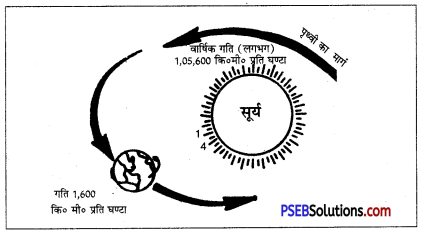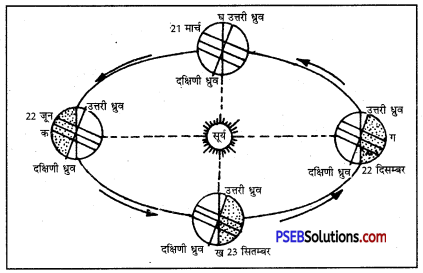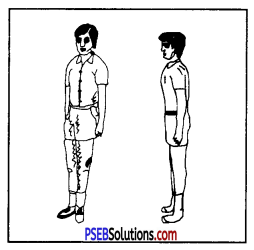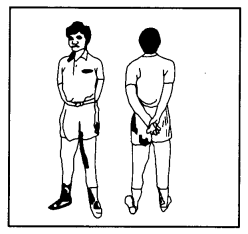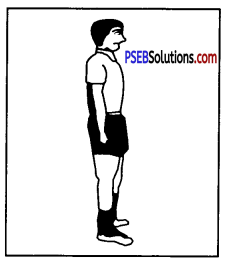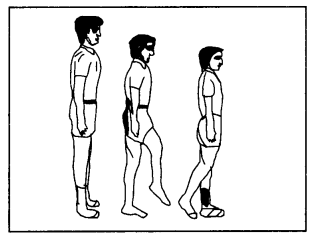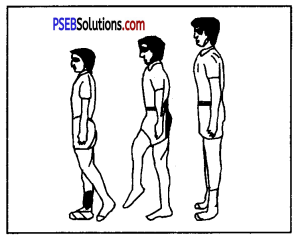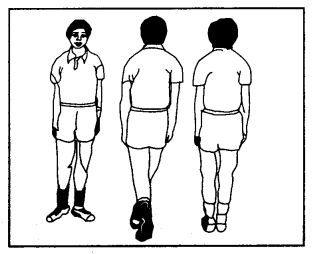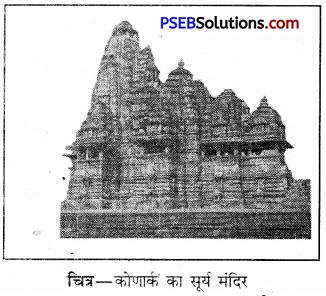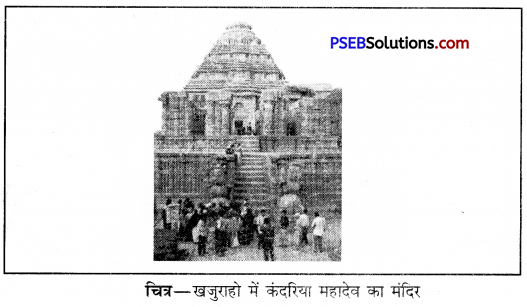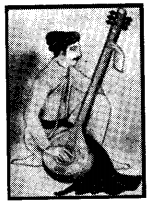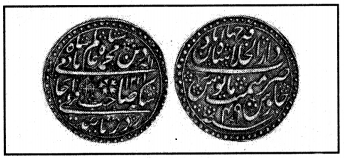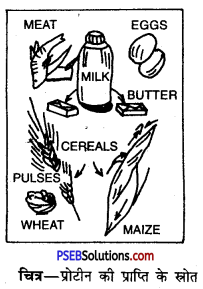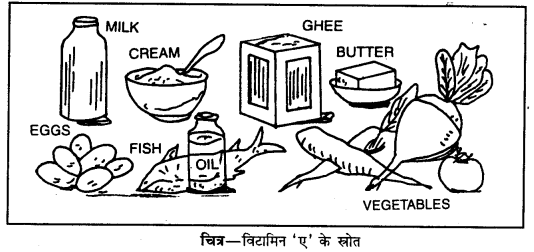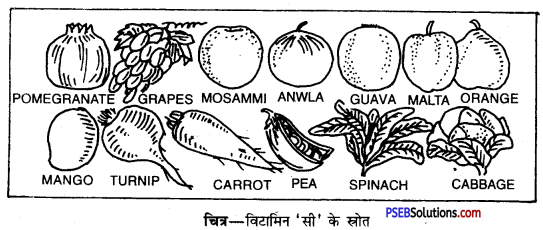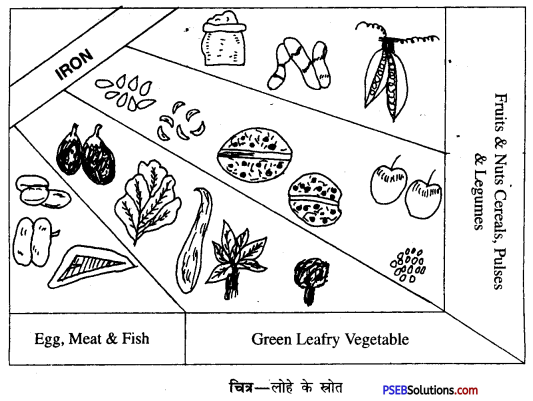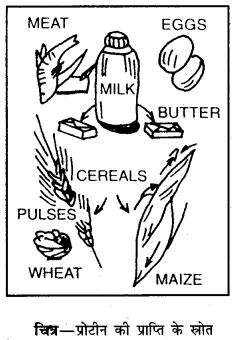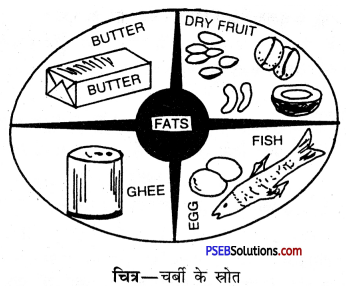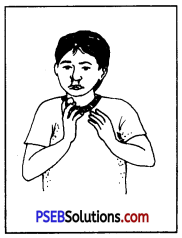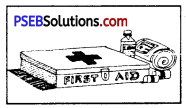Punjab State Board PSEB 11th Class Agriculture Book Solutions Chapter 1 ख़रीफ़ की फसलें Textbook Exercise Questions and Answers.
PSEB Solutions for Class 11 Agriculture Chapter 1 ख़रीफ़ की फसलें
PSEB 11th Class Agriculture Guide ख़रीफ़ की फसले Textbook Questions and Answers
(क) एक-दो शब्दों में उत्तर दो-
प्रश्न 1.
ख़रीफ़ की दो अनाज वाली फसलों के नाम लिखो।
उत्तर-
धान, मक्की तथा ज्वार ।
प्रश्न 2.
धान की दो उन्नत किस्मों के नाम बताओ।
उत्तर-
पी०आर०-123, पी०आर०-122.
प्रश्न 3.
देसी कपास की दोहरी किस्म की एक एकड़ खेती के लिए कितना बीज चाहिए ?
उत्तर-
1.5 किलो बीज प्रति एकड़।
प्रश्न 4.
मक्की को हानि पहुंचाने वाले मुख्य कीट का नाम बताओ।
उत्तर-
मक्की का गन्डोया।

प्रश्न 5.
गन्ने के दो रोगों के नाम बताओ।
उत्तर-
रत्ता रोग, लाल धारियों वाला रोग।
प्रश्न 6.
हरी खाद के रूप में बोई जाने वाली दो फसलों के नाम बताओ।
उत्तर-
सन् तथा लैंचा।
प्रश्न 7.
मक्की की एक एकड़ की बुआई के लिए बीज की मात्रा बताओ।
उत्तर-
पर्ल पॉपकार्न के लिए 7 किलो तथा अन्य किस्मों के लिए 8 किलो प्रति एकड़, चारे वाली मक्की के लिए 30 किलो बीज प्रति एकड़।
प्रश्न 8.
कपास की बुआई का समय बताओ।
उत्तर-
1 अप्रैल से 15 मई।

प्रश्न 9.
गन्ने में बोई जाने वाले एक अन्तर फसल का नाम बताओ। उत्तर-गर्म ऋतु की मूंगी या मांह।। प्रश्न 10. ख़रीफ के चारे की दो फसलों के नाम लिखो।
उत्तर-
मक्की , बाजरा, गवारा आदि।
(ख) एक-दो वाक्यों में उत्तर दो-
प्रश्न 1.
फसल चक्र किसे कहते हैं ?
उत्तर-
पूरे वर्ष में एक खेत में जो फसलें उगाई जाती हैं, उसको फसल चक्कर कहा जाता है, जैसे-धान-गेहूँ, धान-आलू-सूर्यमुखी आदि।
प्रश्न 2.
धान आधारित दो फसल चक्रों के नाम लिखो।
उत्तर-
धान-गेहूँ/बरसीम, धान-गेहूँ-सठ्ठी मक्की, धान-आलू-सठ्ठी मूंगी/सूर्यमुखी।
प्रश्न 3.
हरी खाद क्यों दी जाती है ?
उत्तर-
हरी खाद में फलीदार फसलें होती हैं; जैसे-दालों वाली फसलें, सन्, लैंचा आदि। इन फसलों के कारण भूमि में नाइट्रोजन तत्त्व की वृद्धि होती है तथा हरी खाद की फसल को जुताई करके भूमि में दबा दिया जाता है। इससे भूमि में मल्लहड़ की भी वृद्धि होती है तथा भूमि की उपजाऊ शक्ति में वृद्धि होती है।

प्रश्न 4.
मक्की की बुआई की विधि बताओ।
उत्तर-
मक्की की बुवाई का समय मई के अंतिम सप्ताह से अंत जून तक का है। बुवाई के समय पंक्तियों में फासला 60 सैं०मी० तथा पौधे से पौधे का फासला 22 सैं०मी० रखना चाहिए।
प्रश्न 5.
मक्की में इटसिट की रोकथाम बताओ।
उत्तर-
मक्की में इटसिट की रोकथाम के लिए एट्राटाप नदीन-नाशक का प्रयोग बुवाई से 10 दिनों के अन्दर-अन्दर करना चाहिए।
प्रश्न 6.
धान में कद्दू क्यों किया जाता है ?
उत्तर-
धान की फसल के लिए पानी की अधिक आवश्यकता होती है। कद्दू करने से भूमि में पानी रोकने की शक्ति बढ़ जाती है, पानी का वाष्पीकरण कम होता है। नदीनों की समस्या में कमी आती है। धान की पनीरी लगानी आसान हो जाती है।
प्रश्न 7.
गन्ने की बुआई के लिए बीज की मात्रा बताओ।
उत्तर-
एक एकड़ कमाद के लिए तीन आंखों वाली 20 हज़ार गुल्लियां या चार आंखों वाली 15 हज़ार गुल्लियां या 5 आंखों वाली 12 हज़ार गुल्लियों की आवश्यकता है।

प्रश्न 8.
पतझड़ ऋतु के गन्ने की बुआई का समय और विधि बताओ।
उत्तर-
पतझड़ ऋतु की गन्ने की बुआई का समय 20 सितम्बर से 20 अक्तूबर का है। बुवाई 90 सैं०मी० फासले की पंक्तियों में की जाती है।
प्रश्न 9.
मूंगी के पत्ते सुखाने के लिए स्प्रे का समय और मात्रा बताओ।
उत्तर-
जब कम्बाइन से मूंगी की कटाई करनी हो तो जब लगभग 80% फलियां पक जाती हैं तो ग्रैमक्सोन का स्प्रे करके पत्ते तथा तने सुखा दिये जाते हैं।
प्रश्न 10.
धान में खरपतवार की रोकथाम का तरीका बताओ।
उत्तर-
धान में स्वांक तथा मोथा नदीन होते हैं। पनीरी लगाने से 15 तथा 30 दिन बाद पैडीवीडर के साथ दो गुडाइयां करें या नदीनों को हाथ से खींच कर निकाल दें। उचित दवाइयों का उचित मात्रा में तथा उचित समय पर प्रयोग करना चाहिए।
(ग) पांच-छ: वाक्यों में उत्तर दो-
प्रश्न 1.
धान में हरी खाद के उपयोग के बारे में लिखो।
उत्तर-
गेहूँ की कटाई के शीघ्र बाद ही लैंचा (जंतर) की हरी खाद बो देनी चाहिए तथा इसे दबाने के बाद धान की बुवाई करनी चाहिए। सट्ठी मुंगी को भी गेहूँ काटने के तुरन्त बाद बो कर फलियां तोड़कर मूंगी की फसल को खेत में हरी खाद के तौर पर दबाकर शीघ्र ही धान लगा दें।
हरी खाद में देसी खाद के सभी गुण होते हैं। उससे किसान रासायनिक खादें डालने से बच जाता है क्योंकि फलीदार फसल की फलियों में फॉस्फोरस, रेशे में पोटाशियम तथा जड़ों में नाइट्रोजन मिलती है।

प्रश्न 2.
धान की सीधी बुआई के बारे में जानकारी दो।
उत्तर-
धान की सीधी बुआई केवल मध्यम से भारी भूमियों में ही करनी चाहिए। हल्की (रेतीली) भूमि में फसल में लोहा तत्त्व की कमी हो जाती है तथा फसल की पैदावार कम हो जाती है।
बुवाई का समय-सीधी बुवाई के लिए उचित समय जून का पहला पखवाड़ा है। बीज की मात्रा-इसके लिए बीज की मात्रा 8-10 किलो प्रति एकड़ की आवश्यकता
गहराई तथा पंक्तियों में फासला-बीज को 2-3 सैं०मी० गहराई पर धान वाली ड्रिल से 20 सैं०मी० चौड़ी पंक्तियों में बोना चाहिए। धान की सीधी बुवाई के लिए कम समय पर पकने वाली किस्में ही लेनी चाहिए।
खरपतवार (नदीनों) की रोकथाम-बुवाई से 2 दिनों के अन्दर-अन्दर सटोंप का प्रयोग करना चाहिए। फसल की बुवाई से 30 दिन बाद यदि फसल में स्वांक तथा मोथा नदीन हों तो नोमनीगोल्ड का प्रयोग किया जाता है। चौड़े पत्ते वाले नदीनों के लिए सैगमैंट नदीननाशक का प्रयोग करना चाहिए।
खाद-60 किलो नाइट्रोजन प्रति एकड़ के हिसाब से तीन बराबर भागों में बांट कर बुवाई से दो, पांच तथा नौ सप्ताह बाद छट्टा विधि से डालना चाहिए। सिंचाई-फसल को तीन से पांच दिनों के भीतर पानी देते रहें।
प्रश्न 3.
मक्की में रासायनिक खादों के प्रयोग के बारे में बताओ।
उत्तर-
मक्की में प्रति एकड़ के लिए 50 किलो नाइट्रोजन, 24 किलो फॉस्फोरस तथा 12 किलो पोटाश की आवश्यकता होती है। पोटाश तत्व का प्रयोग मिट्टी जांच के आधार पर करना चाहिए। सारी फॉस्फोरस, सारी पोटाश तथा तीसरा भाग नाइट्रोजन खाद बुवाई करते समय ही डाल देनी चाहिए। नाइट्रोजन का एक भाग जब फसल घुटनों तक बढ़ जाए तो डालें तथा दूसरा भाग बूर पड़ने से पहले डाल देना चाहिए। यदि गेहूँ को फॉस्फोरस की खाद सिफारिश मात्रा में डाली हो तो मक्की के लिए इसकी आवश्यकता नहीं रहती।
प्रश्न 4.
कपास के बीज की शुद्धि का विवरण दो।
उत्तर-
बी०टी० नरमा की किस्मों के लिए 750 ग्राम, बी० टी० रहित दोहरी किस्मों के लिए 1 किलो, साधारण किस्मों के लिए 3 किलो, देसी कपास की दोगली किस्मों के लिए 1.5 किलो तथा साधारण किस्मों के लिए 3 किलो प्रति एकड़ बीज की आवश्यकता होती है। सिफारिश की गई उल्लीनाशक दवाइयों से बीज की सुधाई करें। फसल को तेले से बचाने के लिए बीज को गाचो या करुज़र दवाई लगानी चाहिए।

प्रश्न 5.
गन्ने को गिरने से कैसे बचाया जा सकता है ?
उत्तर-
गन्ने की फसल को गिरने से बचाना चाहिए क्योंकि गिरी फसल पर कोहरे का अधिक प्रभाव पड़ता है। फसल को गिरने से बचाने के लिए मानसून शुरू होने से पहले जून के अन्त में मिट्टी चढ़ा देनी चाहिए। अगस्त के अंत में या सितम्बर के शुरू में फसलों के पूले बांध देने चाहिएं।
Agriculture Guide for Class 11 PSEB ख़रीफ़ की फसले Important Questions and Answers
अति लघु उत्तरीय प्रश्न
प्रश्न 1.
सावनी (खरीफ) की फसल कब बोई जाती है ?
उत्तर-
जून-जुलाई या मानसून के आने पर।
प्रश्न 2.
सावनी (ख़रीफ) की फसल कब काटी जाती है ?
उत्तर-
अक्तूबर-नवम्बर में।

प्रश्न 3.
सावनी (ख़रीफ) की फसलों को किन श्रेणियों में बांटा जाता है ?
उत्तर-
तीन–1. अनाज 2. दालें तथा तेल बीज 3. कपास, कमाद तथा सावनी के चारे।
प्रश्न 4.
सावनी (ख़रीफ) की अनाज वाली फसलें बतायें।
उत्तर-
धान, बासमती, ज्वार, मक्की, बाजरा।
प्रश्न 5.
धान की पैदावार में कौन-सा देश अग्रणी है ?
उत्तर-
चीन।
प्रश्न 6.
भारत में धान की पैदावार सबसे अधिक कहां होती है ?
उत्तर-
पश्चिमी बंगाल।

प्रश्न 7.
धान को किस नाम से जाना जाता है ?
उत्तर-
धान तथा जीरी।
प्रश्न 8.
पंजाब में धान की काश्त के नीचे कितना क्षेत्रफल है ?
उत्तर-
28 लाख हैक्टेयर।
प्रश्न 9.
पंजाब में धान की औसत पैदावार कितनी है ?
उत्तर-
60 क्विंटल प्रति हैक्टेयर।
प्रश्न 10.
धान की कृषि के लिए कद्दू करने से पहले खेत को किस कराहे से समतल करना चाहिए ?
उत्तर-
लेज़र कराहे से।

प्रश्न 11.
धान के लिए बीज की मात्रा बताओ।
उत्तर-
प्रति एकड़ आठ किलो बीज।।
प्रश्न 12.
चौड़े पत्ते वाले धान के नदीन जैसे घरीला आदि के लिए कौन-सी दवाई का प्रयोग किया जाता है ?
उत्तर-
एलग्रिप या सेगमैंट।
प्रश्न 13.
धान की सिंचाई में पानी की बचत के लिए किस यंत्र की सहायता ली जाती है ?
उत्तर-
टैंशीयोमीटर।
प्रश्न 14.
धान की सीधी बुवाई किस तरह की भूमि में ठीक रहती है ?
उत्तर-
मध्यम से भारी भूमि।

प्रश्न 15.
धान की फसल के लिए जिंक की कमी के लिए क्या प्रयोग किया जाता है तथा कितनी मात्रा है ?
उत्तर-
जिंक सल्फेट, 25 किलो प्रति एकड़ के अनुसार।
प्रश्न 16.
धान के दानों को गोदाम में रखने के लिए नमी की मात्रा बताओ।
उत्तर-
12%.
प्रश्न 17.
बासमती की किस्में बताएं।
उत्तर-
पंजाब बासमती-3, पूसा पंजाब बासमती 1509, पूसा पंजाब बासमती-1121.
प्रश्न 18.
बासमती की पनीरी की बुवाई का समय बताओ।
उत्तर-
पूसा पंजाब बासमती 1509 के लिए पनीरी जून के दूसरे पखवाड़े तथा अन्य किस्मों के लिए जून के पहले पखवाड़े में बोई जाती है।

प्रश्न 19.
बासमती को अधिक नाइट्रोजन तत्त्व डालने से क्या होता है ?
उत्तर-
फसल अधिक बढ़ कर गिर जाती है तथा पैदावार कम हो जाती है।
प्रश्न 20.
मक्की की पैदावार में कौन-सा देश अग्रणी है ?
उत्तर-
संयुक्त राज्य अमरीका।
प्रश्न 21.
मक्की की पैदावार में भारत में कौन-सा राज्य आगे है ?
उत्तर-
आंध्रा प्रदेश।
प्रश्न 22.
पंजाब में मक्की की कृषि के अधीन क्षेत्रफल बताएं।
उत्तर-
1 लाख 25 हज़ार हैक्टेयर।

प्रश्न 23.
मक्की की पंजाब में औसत पैदावार बताएं।
उत्तर-
15 क्विंटल प्रति एकड़।
प्रश्न 24.
मक्की के लिए कितनी वर्षा ठीक रहती है ?
उत्तर-
50 से 75 सैं०मी०।
प्रश्न 25.
मक्की के लिए कैसी भूमि ठीक रहती है ?
उत्तर-
अच्छे जल निकास वाली मध्यम से भारी।।
प्रश्न 26.
मक्की की पर्ल पॉपकार्न के लिए बीज की मात्रा बताएं।
उत्तर-
7 किलो प्रति एकड़।

प्रश्न 27.
मक्की की आम प्रयोग वाली किस्में बताएं।
उत्तर-
पी०एम०एच०-1, पी०एम०एच-2.
प्रश्न 28.
मक्की की विशेष प्रयोग वाली किस्में बताओ।
उत्तर-
पंजाब स्वीट कार्न-1, पर्ल पॉपकार्न ।
प्रश्न 29.
मक्की की बुवाई का समय बताएं।
उत्तर-
मई के अंतिम सप्ताह से अन्त जून तक तथा अगस्त के दूसरे पखवाड़े में मक्की की बुवाई की जा सकती है।
प्रश्न 30.
मक्की की बुवाई के लिए पंक्तियों का तथा पौधों का आपसी फासला बताओ।
उत्तर-
60 सैं०मी०, 22 सैं०मी०।

प्रश्न 31.
मक्की में इटसिट के लिए कौन-सा नदीननाशक प्रभावशाली है ?
उत्तर-
एट्राटाप।
प्रश्न 32.
मक्की में कृषि के ढंग से नदीनों की रोकथाम के लिए क्या बोया जाता है ?
उत्तर-
रवाह (चने)।
प्रश्न 33.
डीला/मोथा की रोकथाम के लिए कौन-सी दवाई का प्रयोग करोगे ?
उत्तर-
2, 4-डी।
प्रश्न 34.
साधारण मक्की को कितनी सिंचाई की आवश्यकता होती है ?
उत्तर-
4-6 सिंचाइयों की।

प्रश्न 35.
भारत में सब से अधिक दालों की पैदावार कहां होती है ?
उत्तर-
राजस्थान।
प्रश्न 36.
पंजाब में मूंगी की कृषि के अधीन कितना क्षेत्रफल है ?
उत्तर-
5 हज़ार हैक्टेयर।
प्रश्न 37.
पंजाब में मूंगी की पैदावार बतायें।
उत्तर-
350 किलो प्रति एकड़।
प्रश्न 38.
मुंगी की कृषि के लिए कौन-सी भूमि उचित नहीं है ?
उत्तर-
कलराठी या सेम वाली भूमि।

प्रश्न 39.
मूंगी के लिए बीज की मात्रा बतायें।
उत्तर-
8 किलो बीज प्रति एकड़।
प्रश्न 40.
मुंगी के लिए बुवाई का समय बताओ।
उत्तर-
जुलाई का पहला पखवाड़ा।
प्रश्न 41.
मुंगी के लिए खालों (सियाड़) का फासला तथा पौधे से पौधे का फासला बताओ।
उत्तर-
खालों (सियाड़) का फासला 30 सैं०मी० तथा पौधे से पौधे का फासला 10 सैं०मी०।
प्रश्न 42.
मूंगी में नदीनों (खरपतवार) की रोकथाम के लिए नदीन-नाशक बताओ।
उत्तर-
ट्रेफलिन या वासालीन।

प्रश्न 43.
पंजाब में मांह की कृषि के अधीन क्षेत्रफल बताओ।
उत्तर-
2 हज़ार हैक्टेयर।
प्रश्न 44.
पंजाब मांह की औसत पैदावार बताओ।
उत्तर-
180 किलो प्रति एकड़।
प्रश्न 45.
मांह की कृषि के लिए कौन-सी भूमि ठीक नहीं ?
उत्तर-
लवणीय-क्षारीय, कलराठी, सेम वाली।
प्रश्न 46.
मांह के लिए बीज की मात्रा बताओ।
उत्तर-
6-8 किलो प्रति एकड़।

प्रश्न 47.
अर्द्ध पहाड़ी क्षेत्रों में मांह की बुवाई का समय बताओ।
उत्तर-
15 से 25 जुलाई तक।
प्रश्न 48.
अर्द्ध पहाड़ी क्षेत्रों के अतिरिक्त मांह की बुवाई का समय क्या है ?
उत्तर-
जून के अन्तिम सप्ताह से जुलाई के पहले सप्ताह तक।
प्रश्न 49.
मांह की बुवाई के लिए पंक्तियों में फासला बतायें।
उत्तर-
30 सैं०मी०।
प्रश्न 50.
मांह में कौन-सा कीटनाशक प्रयोग होता है ?
उत्तर-
सटोंप।

प्रश्न 51.
सोयाबीन की पैदावार किस देश में सबसे अधिक होती है ?
उत्तर-
संयुक्त राज्य अमरीका में।
प्रश्न 52.
भारत में सोयाबीन किस राज्य में अधिक होती है ?
उत्तर-
मध्य प्रदेश।
प्रश्न 53.
सोयाबीन आधारित फसल चक्र बतायें।
उत्तर-
सोयाबीन-गेहूँ/जौ।
प्रश्न 54.
सोयाबीन की किस्में बताओ।
उत्तर-
एस०एल०-958, एस०एल०-744.

प्रश्न 55.
सोयाबीन की बुवाई का समय बताओ।
उत्तर-
जून का पहला पखवाड़ा।
प्रश्न 56.
सोयाबीन की बुवाई के लिए पंक्तियों का फासला बताओ।
उत्तर-
45 सैं०मी०।
प्रश्न 57.
सोयाबीन में नदीनों की रोकथाम के लिए कौन-सी दवाइयां प्रयोग की जाती हैं ?
उत्तर-
स्टौंप, परिमेज़।
प्रश्न 58.
सोयाबीन के मुख्य कीड़े बताओ।
उत्तर-
बालों वाली सुंडी तथा सफेद मक्खी।

प्रश्न 59.
ऐसी फसल बताओ जो दाल भी है तथा तेल बीज फसल भी है ?
उत्तर-
सोयाबीन।
प्रश्न 60.
सबसे अधिक तेल बीज पैदा करने वाला देश बताओ।
उत्तर-
संयुक्त राज्य अमरीका।
प्रश्न 61.
भारत में तेल बीज पैदा करने वाला प्रदेश बताओ।
उत्तर-
राजस्थान।
प्रश्न 62.
मूंगफली की पैदावार सबसे अधिक कौन-से देश में है ?
उत्तर–
चीन में।

प्रश्न 63.
मूंगफली की पैदावार भारत में कहां अधिक होती है ?
उत्तर-
गुजरात में।
प्रश्न 64.
पंजाब में मूंगफली की कृषि के अधीन क्षेत्रफल बताओ।
उत्तर-
15 हज़ार हैक्टेयर।
प्रश्न 65.
पंजाब में मूंगफली की औसत पैदावार बताओ।
उत्तर-
7 क्विंटल प्रति एकड़।
प्रश्न 66.
मूंगफली का एक फसली चक्कर बताओ।
उत्तर-
मूंगफली – आषाढ़ी की फसलें।

प्रश्न 67.
मूंगफली की किस्में बताओ।
उत्तर-
एस०जी०-91, एस०जी०-84.
प्रश्न 68.
मूंगफली के बीज की मात्रा बताओ।
उत्तर-
38-40 किलो बीज (गिरियां) प्रति एकड़।
प्रश्न 69.
मूंगफली के लिए बरानी बुवाई का समय बताओ।
उत्तर-
मानसून शुरू होने पर।
प्रश्न 70.
सेंजु फसल वाली मूंगफली के लिए बुवाई का समय बताओ।
उत्तर-
अंत अप्रैल से अंत मई तक।

प्रश्न 71.
मूंगफली में नदीनों की रोकथाम के लिए नदीननाशकों के नाम बताओ।
उत्तर-
टरैफलान, सटोंप।
प्रश्न 72.
ख़रीफ के लिए पशुओं के चारे की फसलें बताओ।
उत्तर-
मक्की, ज्वार (चरी), बाजरा।
प्रश्न 73.
कपास की पैदावार में कौन-सा देश आगे है ?
उत्तर-
चीन।
प्रश्न 74.
कपास भारत में कहां अधिक होती है ?
उत्तर-
गुजरात में।

प्रश्न 75.
पंजाब में कपास के अधीन क्षेत्रफल बताओ ।
उत्तर-
5 लाख हैक्टेयर।
प्रश्न 76.
कपास की पंजाब में औसत पैदावार बताओ।
उत्तर-
230 किलो रूई प्रति एकड़।
प्रश्न 77.
कपास के लिए कौन-सी भूमि ठीक नहीं है ?
उत्तर-
कलराठी तथा सेम वाली।
प्रश्न 78.
नरमे की साधारण किस्म बतायें।
उत्तर-
एल०एच०-2108.

प्रश्न 79.
कपास के लिए बी०टी० नरमे के बीज बताओ।
उत्तर-
750 ग्राम प्रति एकड़।
प्रश्न 80.
देसी कपास की दोहरी किस्में बताओ।
उत्तर-
पी०ए०यू० 626 एच० ।
प्रश्न 81.
कपास की बुवाई के लिए समय बताओ।
उत्तर-
1 अप्रैल से 15 मई।
प्रश्न 82.
कपास के सियाड़ (खाल) में फासला बताओ।
उत्तर-
67 सैं०मी०।

प्रश्न 83.
कपास में प्रयोग किए जाने वाले नदीननाशक के नाम बताओ।
उत्तर-
टरैफलिन, सटोंप, ग्रैमकसोन तथा राऊंडअप।
प्रश्न 84.
कमाद की पैदावार किस देश में अधिक है ?
उत्तर-
ब्राज़ील में।
प्रश्न 85.
भारत में कमाद की पैदावार कहां अधिक है ?
उत्तर-
उत्तर प्रदेश।
प्रश्न 86.
पंजाब में कमाद की कृषि के अधीन क्षेत्रफल बताओ।
उत्तर-
80 हज़ार हैक्टेयर।

प्रश्न 87.
पंजाब में कमाद की औसत पैदावार कितनी है ?
उत्तर-
280 क्विंटल प्रति एकड़।
प्रश्न 88.
कमाद में से चीनी की प्राप्ति कितनी होती है ?
उत्तर-
9%.
प्रश्न 89.
कमाद के लिए कैसी भूमि ठीक रहती है ?
उत्तर-
मध्यम से भारी भूमि।
प्रश्न 90.
बसंत ऋतु की कमाद की अगेती किस्में बताओ।
उत्तर-
सी०ओ०जे०-85, सी०ओ०जे०-83.

प्रश्न 91.
कमाद के बीज के लिए चार आंखों वाली कितनी गुल्लियों की आवश्यकता है ?
उत्तर-
15 हज़ार गुल्लियों की एक एकड़ के लिए।
प्रश्न 92.
भार के अनुसार कमाद के बीज की मात्रा बताओ।
उत्तर-
30 से 35 क्विंटल प्रति एकड़।
प्रश्न 93.
कमाद की बुवाई का समय बताओ।
उत्तर-
मध्य फरवरी से अंत मार्च तक।
प्रश्न 94.
गन्ने में (खरपतवारों) की रोकथाम के लिए प्रयोग की जाती दवाइयां बताओ।
उत्तर-
एट्राटाफ, सैनकोर, 2,4-डी।

प्रश्न 95.
पतझड़ ऋतु की कमाद की किस्में बताओ।
उत्तर-
सी०ओ० जे०-85, सी०ओ०जे०-83.
प्रश्न 96.
पतझड़ ऋतु के कमाद के लिए बुवाई का समय बताओ।
उत्तर-
20 सितम्बर से 20 अक्तूबर।
प्रश्न 97.
कमाद में यदि गेहूँ या राईया बोया हो तो कौन-सा नदीननाशक प्रयोग किया जाना चाहिए ?
उत्तर-
आईसोप्रोटयूरान।
प्रश्न 98.
कमाद में यदि लहसुन बोया हो तो कौन-सा नदीननाशक प्रयोग करना चाहिए ?
उत्तर-
सटोंप।

प्रश्न 99.
एक बड़े पशु को लगभग कितना चारा प्रतिदिन चाहिए ?
उत्तर-
40 किलो हरा चारा।
प्रश्न 100.
सावनी के चारे कौन-से हैं ?
उत्तर-
बाजरा, मक्की, ज्वार (चरी), नेपीयर बाजरा, गिन्नी घास, गवारा, रवाह आदि।
प्रश्न 101.
मक्की का चारा कितने दिनों में तैयार हो जाता है ?
उत्तर-
50-60 दिनों में।
प्रश्न 102.
मक्की की चारे वाली किस्म बताओ।
उत्तर-
जे 1006.

प्रश्न 103.
चारे के लिए मक्की की बुवाई का समय बताओ।
उत्तर-
मार्च के पहले सप्ताह से मध्य सितम्बर तक।
प्रश्न 104.
चारे वाली मक्की को कौन-सा कीट लगता है ?
उत्तर-
मक्की का गड़यां।
प्रश्न 105.
कौन-से चारे को पशु अधिक खुश होकर खाते हैं ?
उत्तर-
ज्वार (चरी)।
प्रश्न 106.
ज्वार की किस्में बताओ।
उत्तर-
एस०एल०-104.

प्रश्न 107.
ज्वार के लिए बीज की मात्रा बताओ।
उत्तर-
20-25 किलो प्रति एकड़।
प्रश्न 108.
अग्रिम या अगेते ज्वार के लिए बुवाई का समय बताओ।
उत्तर-
अगेते चारे के लिए बुवाई मध्य मार्च से शुरू कर देनी चाहिए।
प्रश्न 109.
ज्वार के लिए बुवाई का ठीक समय बतायें।
उत्तर-
मध्य जून से मध्य जुलाई ।
प्रश्न 110.
ज्वार की पंक्तियों में फासला बताओ।
उत्तर-
22 सैं०मी०।

प्रश्न 111.
यदि गवारा तथा चरी मिला कर बोये गये हों तो कौन-सा नदीननाशक प्रयोग होता है ?
उत्तर-
सटोंप।
प्रश्न 112.
बाजरे वाले फसल चक्र के बारे में बताओ।
उत्तर-
बाजरा – मक्की – बरसीम।
प्रश्न 113.
बाजरे की किस्में बताओ।
उत्तर-
पी०एच०बी०एफ०-1, एफ०बी०सी०-16.
प्रश्न 114.
बाजरे के लिए बीज की मात्रा बताओ।
उत्तर-
6-8 किलो बीज प्रति एकड़।

प्रश्न 115.
बाजरे के लिए बुवाई का समय बताओ।
उत्तर-
मार्च से अगस्त।
प्रश्न 116.
बाजरे की बुवाई का ढंग बताओ।
उत्तर-
छट्टा विधि द्वारा बुवाई की जाती है।
प्रश्न 117.
बाजरे में नदीनों की रोकथाम के लिए दवाई बतायें।
उत्तर-
ऐटराटाफ।
प्रश्न 118.
बाजरे की सिंचाई के बारे में बताओ।
उत्तर-
आमतौर पर 2-3 सिंचाइयां काफ़ी है ।

प्रश्न 119.
बाजरे की कटाई कितने दिनों बाद की जाती है ?
उत्तर-
45-55 दिनों बाद।
प्रश्न 120.
बाजरे की बीमारियां बताओ।
उत्तर-
सिट्टों का रोग, गुदियां रोग।
लघु उत्तरीय प्रश्न-
प्रश्न 1.
धान की बुवाई के लिए जलवायु और ज़मीन के बारे में बताओ।
उत्तर-
धान के लिए अधिक गर्मी, अधिक नमी और अधिक पानी की ज़रूरत होती है। इसलिए मध्यम से भारी भूमि अच्छी रहती है। इसके लिए तेज़ाबी से क्षारीय भूमि भी ठीक है।

प्रश्न 2.
धान की बुवाई के लिए बीज की मात्रा और सुधाई के बारे में बताओ।
उत्तर-
एक एकड़ की बुवाई के लिए 8 किलो बीज की पनीरी की ज़रूरत होती है। फसल को रोगों से बचाने के लिए बीज की सिफ़ारिश की गई फंफूदी दवाइयों के घोल में 8-10 घण्टे तक भिगो कर सुधाई कर लेनी चाहिए।
प्रश्न 3.
धान में चौड़े पत्ते वाले नदीनों की रोकथाम के बारे में बताओ।
उत्तर-
धान में चौड़े पत्ते वाले नदीन जैसे-घरीला, सनी आदि पैदा हो जाते हैं। इनकी रोकथाम के लिए एलग्रिप या सैगमैंट में से किसी एक नदीन-नाशक का प्रयोग पनीरी लगाने से 15-20 दिनों बाद करो।
प्रश्न 4.
धान में जिंक की कमी के संबंध में क्या जानते हैं ?
उत्तर-
ज़िक की कमी के कारण पौधे बौने रह जाते हैं पैदावार कमज़ोर दिखाई देती है। पौधों के पत्ते जंग लगे, भूरे हो जाते हैं। पत्ते के बीच वाली नाड़ी का रंग बदल जाता है तथा बाद में पत्ते सूख जाते हैं। जिंक की कमी पूरी करने के लिए कद् करते समय 25 किलो जिंक सल्फेट प्रति एकड़ के हिसाब से बिखेर दें।

प्रश्न 5.
धान की कटाई तथा संभाल के बारे में लिखो।
उत्तर-
जब फसलों की मुंजरें पक जाएं तथा नाड़ी पीली हो जाए तो फसल की कटाई की जाती है। दानों को गोदाम में रखते समय ध्यान रखें कि इनमें नमी की मात्रा 12% से अधिक नहीं होनी चाहिए।
प्रश्न 6.
बासमती की पनीरी की बुवाई का समय बताओ।
उत्तर-
पूसा पंजाब बासमती 1509 की पनीरी जून के दूसरे पखवाड़े तथा पंजाब बासमती-3 तथा पूसा बासमती-1121 की पनीरी जून के पहले पखवाड़े में बोई जाती है।
प्रश्न 7.
बासमती की पनीरी को खेतों में लगाने का समय बताओ।
उत्तर-
पूसा पंजाब बासमती 1509 पनीरी को जुलाई के दूसरे पखवाड़े तथा पंजाब बासमती 3 तथा पूसा बासमती 1121 की पनीरी को जुलाई के पहले पखवाड़े में कद्दू किए खेत में लगाने चाहिएं। प्रति वर्ग मीटर के हिसाब से 33 पौधे लगाएं।

प्रश्न 8.
मक्की के लिए जलवायु तथा भूमि के बारे में बताओ।
उत्तर-
मक्की को उगने से लेकर तैयार होने तक सीलन वाली तथा गर्म जलवायु की आवश्यकता होती है। फसल तैयारी के समय यदि कम सीलन तथा बहुत अधिक तापमान हो तो पत्तों को हानि पहुंचाता है। इससे परागकण सूख जाते हैं तथा परागण क्रिया अच्छी प्रकार नहीं होती तथा दाने कम बनते हैं। 50 सैं०मी० से 75 सें०मी० वर्षा मक्की के लिए ठीक रहती है। अच्छे जल निकास वाली मध्यम से भारी भूमि अच्छी रहती है।
प्रश्न 9.
मक्की के लिए सिंचाई के बारे में बताओ।
उत्तर-
मक्की को 4-6 सिंचाइयों की आवश्यकता होती है परन्तु यह आवश्यकता वर्षा पर निर्भर है। मक्की के तैयार होने तथा सूत कातने के समय पानी देने का विशेष ध्यान रखना चाहिए।
प्रश्न 10.
मक्की की कटाई के बारे में बताओ।
उत्तर-
जब छल्लियों के पर्दे (छिलके या खग्गे) सूखकर भूरे हो जाएं परन्तु टांडे तथा पत्ते बेशक हरे ही रहें। दानों में नमी की मात्रा 15 प्रतिशत से अधिक नहीं होनी चाहिए।

प्रश्न 11.
मूगी के लिए जलवायु तथा भूमि के बारे में बताओ।
उत्तर-
मूंगी के लिए गर्म जलवायु ठीक रहती है। यह फसल अन्य दाल फसलों से अधिक गर्मी तथा शुष्कता सहन कर सकती है। इस फसल के लिए कलराठी तथा सेम वाली भूमि ठीक नहीं है।
प्रश्न 12.
मूंगी के लिए भूमि की तैयारी तथा खाद के बारे में बताओ।
उत्तर-
भूमि की तैयारी के लिए खेत की 2-3 बार जुताई की जाती है तथा सुहागा चला कर समतल किया जाता है। इस प्रकार प्रति एकड़ के हिसाब से बुवाई के समय 5 किलो नाइट्रोजन तथा 16 किलो फास्फोरस ड्रिल की जाती है।
प्रश्न 13.
मूंगी के लिए नदीनों को रोकथाम के बारे में बताओ।
उत्तर-
नदीनों की रोकथाम के लिए एक या दो गुडाइयां करनी चाहिए। नदीनों की रोकथाम के लिए ट्रेफलिन या वासालीन नदीननाशक को बुवाई से पहले प्रयोग किया जाना चाहिए या सटोंप को बुवाई से 2 दिनों के भीतर-भीतर प्रयोग करना चाहिए।

प्रश्न 14.
मूंगी की कटाई के बारे में बताओ।
उत्तर-
मूंगी की जब 80% के लगभग फलियां पक जाएं तो इसको दातरी से काटा जाता है। गहाई के लिए ग्रैशर का प्रयोग भी किया जाता है। यदि कम्बाइन से मूंगी काटनी हो तो जब लगभग 80% फलियां पक जाएं तो ग्रेगकसोन का छिड़काव करके पत्ते तथा तने सुखा दिए जाते हैं।
प्रश्न 15.
मांह के लिए जलवायु तथा भूमि के बारे में बताओ।
उत्तर-
इस फसल के लिए गर्म तथा नमी वाली जलवायु उचित है। इस के लिए लगभग हर प्रकार की भूमि ठीक रहती है परन्तु लवणीय क्षारीय, कलराठी या सेम वाली भूमि इसकी कृषि के लिए उचित नहीं है।
प्रश्न 16.
मांह की उन्नत किस्मों, भूमि की तैयारी तथा नदीनों की रोकथाम के बारे में बतायें।
उत्तर-
- उन्नत किस्में-मांह 114, मांह 338.
- भूमि की तैयारी-दो या तीन बार जुताई के बाद सुहागा चलायें।
- नदीनों की रोकथाम-बुवाई से एक माह बाद एक गुडाई करनी चाहिए या बुवाई से 2 दिनों के अन्दर सटोंप का छिड़काव किया जाता है।

प्रश्न 17.
माह के लिए बुवाई का समय बताओ।
उत्तर-
मांह की नीम पहाड़ी क्षेत्रों में बुवाई 15 से 25 जुलाई तक तथा दूसरे क्षेत्रों में जून के अन्तिम सप्ताह से जुलाई के पहले सप्ताह तक करनी चाहिए। असिंचित (बरानी)
स्थितियों में बुवाई मानसून शुरू होने पर की जाती है। बुवाई 30 सैं०मी० दूरी की पंक्तियों में की जाती है।
प्रश्न 18.
मांह की फसल के लिए सिंचाई तथा कटाई के बारे में बताओ।
उत्तर-
- सिंचाई-साधारणतया सिंचाई की आवश्यकता नहीं होती परन्तु गर्मी अधिक होने पर एक पानी की आवश्यकता होती है।
- कटाई-जब पत्ते झड़ जाते हैं तथा फलियां स्लेटी काली हो जाएं तो फसल कटाई के लिए तैयार होती है।
प्रश्न 19.
सोयाबीन के लिए जलवायु तथा भूमि के बारे में बताओ।
उत्तर-
इस फसल के लिए गर्म जलवायु की आवश्यकता है। इसको सभी प्रकार की भूमियों में बोया जा सकता है परन्तु अच्छे जल निकास वाली, लवण तथा क्षार से रहित उपजाऊ भूमि इसकी कृषि के लिए उचित रहती है।

प्रश्न 20.
सोयाबीन वाला फसल चक्र, इसकी उन्नत किस्में तथा भूमि की तैयारी के बारे में बताओ।
उत्तर-
1. फसल चक्र-सोयाबीन-गेहूँ/जौ।
2. उन्नत किस्में-एस०एल०-958, एस०एल० 744.
3. भूमि की तैयारी-भूमि को दो बार जोतकर हर बार सुहागा फेर कर समतल करें।
प्रश्न 21.
सोयाबीन के लिए बीज की मात्रा तथा शुद्धि के बारे में बताओ तथा बुवाई का ढंग भी बताओ।
उत्तर-
बीज की मात्रा 25-30 किलो प्रति एकड़ के हिसाब से आवश्यकता है। शुद्धि सिफ़ारिश की गई फंफूदी नाशक दवाइयों से करनी चाहिए। यदि पहली बार खेत में बुवाई करनी हो तो बीज को जीवाणु खाद कल्चर ज़रूर लगाएं। बुवाई 45 सैं०मी० की पंक्तियों में की जाती है।
प्रश्न 22.
सोयाबीन में नदीनों की रोकथाम के बारे में बतायें।
उत्तर-
दो बार गुडाई करें। गुडाई बुवाई से 20 तथा 40 दिनों बाद करनी चाहिए। बुवाई के 1-2 दिनों के अन्दर सटोंप या बुवाई से 15-20 दिनों बाद परीमेज़ का स्प्रे करके नदीनों की रोकथाम की जा सकती है।

प्रश्न 23.
सोयाबीन के लिए खादों के बारे में बताओ।
उत्तर-
सोयाबीन की बुवाई से पहले 4 टन प्रति एकड़ के हिसाब से रूड़ी का प्रयोग करें। बुवाई के समय फसल को 13 किलो नाइट्रोजन तथा 32 किलो फास्फोरस प्रति एकड़ के हिसाब से डालें।
प्रश्न 24.
सोयाबीन की सिंचाई के बारे में बतायें।
उत्तर-
सोयाबीन को आमतौर पर 3-4 सिंचाइयों की आवश्यकता होती है जब फलियों में दाने पड़ जाते हैं तब पानी देना आवश्यक है परन्तु वर्षा ठीक मात्रा में हो जाए तो पानी की आवश्यकता नहीं है।
प्रश्न 25.
सोयाबीन की कटाई के बारे में बताओ।
उत्तर-
जब बहुत सारे पत्ते झड़ जाएं तथा फलियों का रंग बदल जाए तो फसल की कटाई कर देनी चाहिए। जब दाने स्टोर करने हों तो दानों में नमी 7% से अधिक नहीं होनी चाहिए।

प्रश्न 26.
सोयाबीन के कीट तथा रोगों के बारे में बताओ।
उत्तर-
बालों वाली सूंडी तथा सफेद मक्खी इसके मुख्य कीट हैं तथा चितकबरा रोग इसकी मुख्य बीमारी है।
प्रश्न 27.
मूंगफली के लिए जलवायु तथा भूमि के बारे में बताओ।
उत्तर-
बरानी फसल के लिए जुलाई, अगस्त तथा सितम्बर में लगभग 50 सैं०मी० एक जैसी वर्षा बहुत आवश्यक है। हल्की तथा मध्यम भूमि इसके लिए ठीक है।
प्रश्न 28.
मूंगफली के लिए उन्नत किस्में भूमि की तैयारी तथा फसल चक्कर बताओ।
उत्तर-
उन्नत किस्में-एस०जी०-99, एस०जी०-84. भूमि की तैयारी-दो बार जुताई करके खेत तैयार हो जाता है। फसल चक्कर-मूंगफली – आषाढ़ी (रबी) की फसलें।

प्रश्न 29.
मूंगफली के लिए बीज की मात्रा तथा सुधाई, बुवाई का ढंग बताओ।
उत्तर-
सिफ़ारिश की गई उल्लीनाशक दवाइयों से बीज की सुधाई की जाती है। बीज की मात्रा 38-40 किलो बीज (गिरी) प्रति एकड़ प्रयोग किया जाता है। फसल की बुवाई के लिए रौणी करके 30 x 15 सैं०मी० की दूरी पर बोया जाना चाहिए।
प्रश्न 30.
मूंगफली के लिए खादों के बारे में बताओ।
उत्तर-
मूंगफली को 6 किलो नाइट्रोजन, 8 किलो फॉस्फोरस तथा 10 किलो पोटाश की एक एकड़ के हिसाब से आवश्यकता होती है। पोटाश का प्रयोग मिट्टी की जांच करवा कर ही करनी चाहिए। फॉस्फोरस तत्त्व के लिए सुपरफॉस्फेट का प्रयोग करना चाहिए। इसमें सल्फर तत्त्व होता है जो कि तेल बीज फसलों के लिए ज़रूरी है। यदि फॉस्फोरस की आवश्यकता न हो तो 50 किलो जिप्सम प्रति एकड़ के हिसाब से प्रयोग करें।
प्रश्न 31.
मूंगफली में नदीनों की रोकथाम के बारे में बताओ।
उत्तर-
इसके लिए 3 तथा 6 सप्ताह के बाद दो गुडाइयां की जाती हैं। नदीनों की रोकथाम के लिए बुवाई के दो दिनों के अन्दर सटोंप का छिड़काव किया जाता है या टरैफलान के छिड़काव के बाद उसी दिन मूंगफली बो दें।

प्रश्न 32.
मूंगफली की सिंचाई के बारे में बताओ।
उत्तर-
मूंगफली को वर्षा पर निर्भर करते हुए 2 या 3 सिंचाइयों की आवश्यकता होती है। यदि वर्षा न हो तो फूल पड़ने पर पहला पानी देना चाहिए। गट्ठियां बन जाने पर वर्षा अनुसार एक या दो पानी लगाए जाते हैं।
प्रश्न 33.
मूंगफली की खुदाई कीट तथा रोगों के बारे में बताओ।
उत्तर-
मूंगफली की खुदाई-सारी फसल जब एक जैसी पीली हो जाए तथा पुराने पत्ते झड़ने लगते हैं तो मूंगफली की खुदाई करनी चाहिए।
कीड़े तथा रोग-कंबल कीड़ा (भब्बू कुत्ता) सफेद सूंड, चेपा इसके मुख्य कीट हैं तथा बीज का गलना, गिच्ची का गलना तथा टिक्का रोग इसके मुख्य रोग हैं।
प्रश्न 34.
कपास के लिए जलवायु तथा भूमि के बारे में बताओ।
उत्तर-
कपास के लिए गर्म तथा शुष्क जलवायु की आवश्यकता है। इसकी कृषि के लिए कलराठी तथा सेम वाली भूमियों के अलावा सभी प्रकार की भूमि ठीक रहती है।

प्रश्न 35.
नरमे की किस्में तथा फसल चक्र बताओ।
उत्तर-
फसल चक्र-कपास-गेहूँ/जौं, कपास-सूर्यमुखी, कपास-राईया, कपास-सेंजी/ बरसीम/जवी।
उन्नत किस्म-बी०टी० किस्म-एन०एस०सी०-855, अंकुर 3028, एम०आर०सी०7017, आर०सी०एच०-650.
बी०टी० रहित दोगली किस्म-एल०एच०-144. साधारण किस्म-एल०एच०-2108. देसी दोहरी किस्में-पी०ए०यू०-626 एच। देसी साधारण किस्में-एफ०डी०के०-124, एल०डी०-694.
प्रश्न 36.
नरमे के लिए बीज की मात्रा तथा शुद्धि के बारे में बताओ।
उत्तर-
बीज की मात्रा-प्रति एकड़ के हिसाब से निम्नलिखित अनुसार हैबी०टी० नरमा-700 ग्राम। बी०टी० रहित दोहरी किस्म-1 किलो। साधारण किस्म-3 किलो। देसी कपास की दोहरी किस्म-1.5 किलो। देसी साधारण किस्म-3 किलो।।
बीज की सुधाई सिफ़ारिश की गई फफूंदीनाशक दवाइयों से की जाती है। फसल को तेले से बचाने के लिए बीज को गाचो या क्रूज़र दवाई लगायें।
प्रश्न 37.
नरमे की बुवाई का समय तथा ढंग बताओ।
उत्तर-
समय-1 अप्रैल से 15 मई। खाइयों की दूरी-67 सैं०मी० ।
पौधे से पौधे का फासला-साधारण किस्मों के लिए 60 सैं०मी०, बी०टी० तथा बी०टी० रहित दोहरी किस्मों के लिए 75 सैं०मी०, देसी कपास की किस्मों के लिए 45 सैं०मी०, देसी कपास की दोहरी किस्मों के लिए 60 सैं०मी०।

प्रश्न 38.
नरमे में नदीनों की रोकथाम के बारे में बताओ।
उत्तर-
नदीनों की रोकथाम के लिए गुडाई की जाती है। कुल 2 से 3 गुडाइयां की जाती हैं। पहली गुडाई पहली सिंचाई से पहले की जाती है। गुडाई करने के लिए ट्रैक्टर से चलने वाले टिल्लर या बैलों से चलने वाली त्रिफाली से भी की जा सकती है। इटसिट/ चुपत्ती तथा मधाना/मकड़ा को काबू करने के लिए ट्रैफलिन का प्रयोग बुवाई से पहले किया जाता है या सटोंप का बुवाई के 24 घण्टे के भीतर-भीतर छिड़काव किया जाता है तथा इसके 45 दिनों के बाद एक गुडाई करें या ग्रामैकसोन तथा राऊंडअप में से एक दवाई को सुरक्षित हुड लगा कर फसल की पंक्तियों में नदीनों के ऊपर सीधा छिड़काव करें।
प्रश्न 39.
नरमे के लिए खादों के प्रयोग के बारे में बताओ।
उत्तर-
साधारण किस्में-30 किलो नाइट्रोजन तथा 12 किलो फॉस्फोरस प्रति एकड़।
बी०टी० तथा बी०टी० रहित दोहरी किस्मों के लिए-60 किलो नाइट्रोजन तथा 12 किलो फॉस्फोरस प्रति एकड़ के लिए पोटाश तत्व वाली खाद मिट्टी की जांच करवा कर ही डालें। सारी फॉस्फोरस बुवाई के समय ही तथा आधी नाइट्रोजन पौधे विरले करते समय तथा शेष नाइट्रोजन फूल निकलने के समय डालें।
प्रश्न 40.
नरमे के लिए सिंचाई तथा चुनने के बारे में बताओ।
उत्तर-
वर्षा पर निर्भर करते हुए 4 से 6 सिंचाइयों की आवश्यकता होती है। पहली सिंचाई बुवाई से 4 से 6 सप्ताह बाद तथा बाद में सिंचाई दो या तीन सप्ताह के अन्तर पर करनी चाहिए।
चुगाई-मण्डी में अच्छा मूल्य लेने के लिए 15-20 दिनों के अन्तर पर साफ़ तथा सूखे नरमे को चुन लेना चाहिए।

प्रश्न 41.
नरमे के कीड़ों के बारे में बताओ।
उत्तर-
नरमे को हानि पहुंचाने वाले कीड़े हैं-तेला, चेपा, मीली वग, गुलाबी सूंडी, अमरीकन सूंडी, तंबाकू की सूंडी, सफेद मक्खी आदि।
प्रश्न 42.
बी०टी० कपास पर कौन-सा कीड़ा हमला नहीं करता तथा कौन-से करते हैं ?
उत्तर-
बी०टी० कपास पर अमरीकन सूंडी हमला नहीं करती क्योंकि इसमें एक बैक्टीरिया का जीन डाला जाता है जो एक प्रोटीन पैदा करता है जिसको खाने से सूंडियां मर जाती हैं। रस चूसने वाले कीडे तथा तंबाकू की संडी का इस पर हमला हो सकता है।
प्रश्न 43.
कमाद के लिए जलवायु तथा भूमि के बारे में बताओ।
उत्तर-
गर्म जलवायु कमाद के लिए ठीक रहती है। इसके लिए मध्यम से भारी भूमि ठीक रहती है। यह फसल क्षारीय तथा लवणी भूमि के प्रति कुछ सीमा तक सहनशील है।

प्रश्न 44.
बसंत ऋतु की कमाद के लिए उन्नत किस्मों तथा फसल चक्र के बारे में बताओ।
उत्तर-
फसल चक्र-धान/मक्की/कपास-राईया-कमाद-पहले वर्ष की कटाई के बाद बचा गन्ने का भाग (मूढा)-दूसरे वर्ष का बचा गन्ने का भाग (मूढा)-गेहूं।
उन्नत किस्में-अगेती किस्में-सी०ओ०जे०-85, सी०ओ०जे०-83. मध्यम किस्में-सी०ओ०पी०बी०-91 तथा सी०ओ०जे०-88. पिछेती किस्म-सी०ओ०जे०-89.
प्रश्न 45.
कमाद के लिए भूमि की तैयारी के बारे में बताओ।
उत्तर-
खेत को चार से छः बार जुताई की आवश्यकता है। प्रत्येक जुताई के बाद सुहागा फेरना चाहिए। इस फसल के लिए 45-50 सैं०मी० गहरी जुताई की आवश्यकता होती है तथा यह फसल के लिए लाभदायक है क्योंकि इस प्रकार भूमि के नीचे बनी सख्त सतह टूट जाती है, पानी की धरती में समाने की शक्ति बढ़ जाती है तथा गन्ने की जड़ों को गहरा जाने में सहायक सिद्ध होती है।
प्रश्न 46.
कमाद के लिए बीज का चुनाव तथा भार अनुसार बीज की मात्रा बताओ।
उत्तर-
बुवाई के लिए गन्ने का ऊपरी दो बटा तीन (2/3) निरोल भाग ही प्रयोग करना अच्छा रहता है। भार के अनुसार कमाद के बीज की 30 से 35 क्विंटल प्रति एकड़ के हिसाब से आवश्यकता पड़ती है।

प्रश्न 47.
कमाद के लिए बुवाई का समय तथा ढंग बताओ।
उत्तर-
बुवाई का समय-मध्य फरवरी से अंत मार्च तक।
बुवाई का ढंग-75 सैं०मी० वाली खाइयों में गुल्लियां रखकर सुहागा फेरा जाता है तथा फिर पानी लगा दिया जाता है। एक और पानी 4-5 दिनों के बाद लगाया जाता है।
प्रश्न 48.
गन्ने की फसल में अन्तर फसलों के बारे में क्या जानते हो ?
उत्तर-
गन्ने की दो पंक्तियों में गर्म ऋतु की मूंगी या मांह की एक पंक्ति बो कर इन फसलों का 1 से 2 क्विंटल प्रति एकड़ उत्पादन अधिक लिया जा सकता है। इन फसलों की बुवाई से भूमि की उपजाऊ शक्ति बढ़ती है तथा गन्ने की पैदावार पर भी बुरा प्रभाव नहीं होता।
प्रश्न 49.
गन्ने की फसल के लिए खादों के बारे में बताओ।
उत्तर-
गोबर की खाद-गन्ने की फसल के लिए बुवाई से 15 दिन पहले 8 टन गोबर की खाद प्रति एकड़ के हिसाब से डाली जाती है।
नाइट्रोजन खाद-बीज वाली (नई) फसल के लिए 60 किलो नाइट्रोजन तथा गन्ने की कटाई के बाद बचे (मूढा) भाग से बोई फसल के लिये 90 किलो नाइट्रोजन प्रति एकड़ के हिसाब से डाली जाती है।
फॉस्फोरस तत्व-मिट्टी की जांच के आधार पर यदि फॉस्फोरस की कमी हो जाए तो 12 किलो फॉस्फोरस प्रति एकड़ के हिसाब से डाली जाती है। पंजाब में साधारणत: पोटाश तत्व की कमी नहीं होती।

प्रश्न 50.
कमाद के लिए खादें तथा डालने का ढंग बताओ।
उत्तर-
खाद – डालने का ढंग
नाइट्रोजन:
- बीज फसल को नाइट्रोजन खाद का आधा भाग कमाद जमने के बाद पहले पानी के साथ डाला जाता है।
- शेष आधी खाद मई-जून में डाली जाती है।
- गन्ने को काटने के बाद बचे भाग (मूढा) से तैयार फसल के लिए नाइट्रोजन वाली खाद को फरवरी-अप्रैल तथा मई में डाला जाता है।
फॉस्फोरस
- खालों में गुल्लियों के नीचे डाली जाती है।
- मूढे वाली फसल में फरवरी से जुलाई के समय कमाद की पंक्तियों के पास ड्रिल की जाती है।
प्रश्न 51.
गन्ने में नदीन की रोकथाम के बारे में बताओ।
उत्तर-
नदीनों की रोकथाम के लिए दो तीन गुडाइयां की जाती हैं। नदीनों की रोकथाम पंक्तियों में पुआल बिछा कर भी की जाती है। यदि दवाई का प्रयोग करना हो तो एटराटाफ या सैनकोर की स्प्रे बुवाई से दो-तीन दिनों के भीतर-भीतर की जाती है। लपेटा वेल तथा चौड़े पत्ते वाले नदीनों के लिए 2,4-डी का प्रयोग किया जाता है। यदि गन्ना में मूंगी या मांह बोया हो तो पहले बताए नदीननाशकों की जगह पर बुवाई से दो दिन के अन्दर ‘सटोंप का छिड़काव करना चाहिए।
प्रश्न 52.
गन्ने को सिंचाई की आवश्यकता के बारे में बताओ।
उत्तर-
अप्रैल से जून में गर्म तथा शुष्क मौसम होता है। इसलिए इन दिनों में 7 से 12 दिनों के अन्तर पर पानी लगाते रहना चाहिए। सर्दी में पानी एक महीने के अन्तर पर लगाया जाता है।

प्रश्न 53.
गन्ने की फसल को कोरे से बचाने के बारे में बताओ।
उत्तर-
गन्ने की फसल को गिरने नहीं देना चाहिए। गिरी हुई फसल पर कोरे का अधिक प्रभाव होता है। सर्दी में फसल को पानी लगाने से भूमि गर्म रहती है तथा फसल पर कोरे का अधिक प्रभाव नहीं होता। यदि फसल मूढे वाली रखने के लिए काटी हो तो खेत को पानी लगा देना चाहिए तथा खेत को पंक्तियों के बीच में से जोतना चाहिए।
प्रश्न 54.
पतझड़ ऋतु के कमाद की उन्नत किस्मों तथा बुवाई का समय तथा ढंग भी बताओ।
उत्तर-
उन्नत किस्में-सी०ओ०जे०-85, सी०ओ०जे०-83. बुवाई का समय-20 सितम्बर से 20 अक्तूबर। पंक्तियों में फासला-90 सैं०मी० अन्तर।
प्रश्न 55.
पतझड़ ऋतु वाली कमाद के लिए अन्तर फसलों तथा नदीनों की रोकथाम के बारे में बताओ।
उत्तर-
अन्तर फसलें-पतझड़ ऋतु वाली कमाद के लिए अन्तर फसलें हैं-आलू, गेहूँ, तोरीया, बंदगोभी, राईया, गोभी सरसों, चने, मटर, मूली, लहसुन आदि।
नदीनों की रोकथाम–गन्ने की फसल में यदि गेहूँ या राईया बोया हो तो आईसोप्रोटयूरान तथा यदि लहसुन बोया हो तो सटोंप का प्रयोग करना चाहिए।

प्रश्न 56.
पतझड़ की कमाद के लिए खादों के बारे में बताओ।
उत्तर-
पतझड़ की कमाद के लिए 90 किलो नाइट्रोजन प्रति एकड़ की आवश्यकता होती है। नाइट्रोजन खाद के तीन बराबर भाग किए जाते हैं तथा एक भाग बुवाई के समय, एक भाग मार्च के अन्त में तथा शेष रहता तीसरा भाग अप्रैल के अन्त में डाला जाता है। मिट्टी जांच के आधार पर फॉस्फोरस तथा पोटाश खाद का प्रयोग किया जाता है।
प्रश्न 57.
चारे वाली मक्की की बुवाई का समय तथा ढंग बताओ।
उत्तर-
बुवाई का समय-मार्च के पहले सप्ताह से लेकर मध्य सितम्बर तक।
पंक्तियों में फासला – 30 सैं०मी० ।
प्रश्न 58.
चारे वाली मक्की के लिए खादों का विवरण दें।
उत्तर-
खेत तैयार करने से पहले 10 टन गोबर की खाद का प्रयोग किया जाता है। बुवाई के समय 23 किलो नाइट्रोजन तथा 12 किलो फॉस्फोरस खाद की आवश्यकता होती है।

प्रश्न 59.
चारे वाली मक्की के लिए नदीनों की रोकथाम बारे बताओ।
उत्तर-
नदीनों की रोकथाम के लिए एटराटाफ का प्रयोग किया जाता है। इसको बुवाई से पहले दो दिन के भीतर-भीतर प्रयोग करो। छिड़काव, नदीनों के 2 से 3 पत्ते आ जाने पर भी किया जा सकता है। जब मक्की के चारे में खाद मिला कर बोया हो तो सटोंप की बुवाई से 2 दिनों के अन्दर छिड़काव करना चाहिए।
प्रश्न 60.
चारे की मक्की के लिए कटाई तथा कीड़े के बारे में बताओ।
उत्तर-
मक्की की फसल दोधे पर हो तथा दाने नर्म होने पर फसल कटाई के लिए तैयार होती है। इसको लगभग 50-60 दिन लगते हैं।
मक्की का गड़यां इस का मुख्य कीड़ा है।
प्रश्न 61.
ज्वार (चरी) के लिए जलवायु तथा भूमि के बारे में बताओ।
उत्तर-
ज्वार की फसल के लिए गर्म तथा शुष्क जलवायु ठीक रहती है। यह प्रत्येक प्रकार की भूमि में हो सकती है परन्तु भारी भूमि के लिए उचित रहती है।

प्रश्न 62.
ज्वार की उन्नत किस्में, भूमि की तैयारी, बीज की मात्रा तथा सुधाई के बारे में बताओ।
उत्तर-
उन्नत किस्में-एस०एल०-44.
भूमि की तैयार-खेत की तैयारी के लिए एक बार तवियों तथा दो बार कल्टीवेटर से जुताई की जाती है।
बीज की मात्रा तथा सुधाई-20-25 किलो बीज प्रति एकड़ की आवश्यकता है। इसकी सिफ़ारिश की गई उल्लीनाशक दवाइयों से सुधाई की जाती है।
प्रश्न 63.
ज्वार के लिए नदीनों की रोकथाम के बारे में बताएं।
उत्तर-
खाद-ज्वार की बुवाई से दो दिनों के अन्दर एटराटाफ का छिड़काव किया जाता है। इससे इटसिट/चुपत्ती की अच्छी तरह रोकथाम हो जाती है। जब गवारा तथा चरी को मिला कर बोया जाता है तो सटोप का छिड़काव बुवाई से दो दिनों के भीतर-भीतर करना चाहिए।
प्रश्न 64.
ज्वार के लिए खाद तथा सिंचाई के बारे में बताओ।
उत्तर-
खाद-इसको बुवाई के समय 8 किलो फॉस्फोरस की आवश्यकता है तथा नाइट्रोजन की 20 किलो मात्रा भी बुवाई के समय तथा महीने बाद शेष 20 किलो नाइट्रोजन की आवश्यकता होती है। यह सभी खादें एक एकड़ के लिए हैं।
सिंचाई-अगेते मौसम के चारे, मार्च-जून वाले को 5 सिंचाइयों की आवश्यकता है। वर्षा वाली फसल को वर्षा के अनुसार 1-2 पानी देने की आवश्यकता है।

प्रश्न 65.
ज्वार की कटाई, कीड़े तथा रोग के बारे में बताओ।
उत्तर-
कटाई-जब लगभग 65-80 दिनों की फसल गोभे से दोधे की अवस्था में होती है तो इसकी कटाई कर लेनी चाहिए। इस अवस्था में अधिक आहारीय तत्त्व प्राप्त हो जाते हैं।
कीड़े तथा रोग-शाख की मक्खी, घोड़ा तथा गुझिया इसके मुख्य कीड़े हैं। बीज सड़ना तथा छोटे पौधों का मरना इसके मुख्य रोग हैं।
प्रश्न 66.
बाजरे के लिए फसल चक्र, उन्नत किस्में, भूमि की तैयारी के बारे में बताओ।
उत्तर-
फसल चक्र-बाजरा-मक्की-बरसीम। उन्नत किस्में-पी०एच०बी०एफ०-1, एफ०बी०सी०-16. भूमि की तैयारी-भूमि की 2-3 बार जुताई करनी चाहिए।
प्रश्न 67.
बीज की मात्रा तथा सुधाई, बुवाई का समय तथा ढंग के बारे में बताओ।
उत्तर-
बीज की मात्रा तथा सुधाई-6-8 किलो बीज प्रति एकड़ की आवश्यकता है। सुधाई के लिए सिफ़ारिश की गई उल्लीनाशक दवाई का प्रयोग करो।
बुवाई का ढंग और समय-मार्च से अगस्त में बुवाई करनी चाहिए। बुवाई छट्टा विधि से की जाती है।

प्रश्न 68.
बाजरे के लिए नदीनों की रोकथाम, सिंचाई, कटाई के बारे में बताओ।
उत्तर-
नदीनों की रोकथाम-एटराटाफ का छिड़काव बुवाई से 2 दिनों के अन्दर करें। सिंचाई-इसको 2-3 सिंचाइयों की आवश्यकता होती है।
कटाई-बुवाई से 45-55 दिनों बाद जब बल्लियां निकलनी शुरू होने वाली होती हैं, फसल कटाई के लिए तैयार होती है।
प्रश्न 69.
बाजरे के लिए खादों का विवरण दें।
उत्तर-
बाजरे के खेत की तैयारी से पहले 10 टन गोबर की खाद प्रति एकड़ का प्रयोग किया जाता है। बुवाई के समय 10 किलो नाइट्रोजन प्रति एकड़ तथा 10 किलो बुवाई से 3 सप्ताह बाद डाली जाती है ।
प्रश्न 70.
बाजरे के कीड़े तथा बीमारियों के बारे में बताओ।
उत्तर-
बाजरे को हानि पहुंचाने वाले कीड़े हैं-स्लेटी भंडी, जड़ का कीड़ा, घोड़ा इसके मुख्य कीड़े हैं तथा बल्लियों के रोग तथा गुंदीया रोग इसकी मुख्य बीमारियां हैं।

दीर्घ उत्तरीय प्रश्न-
प्रश्न 1.
बाजरे की कृषि का विवरण दें।
उत्तर-
स्वयं करें।
प्रश्न 2.
धान की पनीरी की बुवाई के बारे में बताओ।
उत्तर-
धान की पनीरी की बुवाई के लिए उचित समय 15 से 30 मई का है। भूमि की तैयारी के समय 12-15 टन गली-सड़ी गोबर की खाद प्रति एकड़ प्रयोग करनी चाहिए। पनीरी की बुवाई के समय आवश्यक खादें; जैसे-12 किलो नाइट्रोजन, 10 किलो फॉस्फोरस तथा 13 किलो जिंक प्रति एकड़ के हिसाब से डालनी चाहिए। बीजों की सुधाई करके गीली बोरियों के ऊपर 7-8 सैं०मी० मोटी सतह में बिखेर दिया जाता है तथा ऊपर से गीली बोरियों से ढक दिया जाता है। इन ढके बीजों के ऊपर समय-समय पर पानी का छिड़काव करते रहना चाहिए। बीज 24 से 36 घण्टे के अन्दर अंकुरित हो जाते हैं। इन्हें छट्टा विधि से बो देना चाहिए। साढ़े छ: मरले में 8 किलो बीज की पनीरी एक एकड़ के लिए काफ़ी रहती है। पनीरी में नदीनों की रोकथाम बूटाकलोर या सोफिट के प्रयोग से की जाती है। पनीरी की बुवाई से 15 दिन बाद 12 किलो नाइट्रोजन प्रति एकड़ और डालनी चाहिए। 25-30 दिनों में पनीरी खेत में लगाने के लिए तैयार हो जाती है।
प्रश्न 3.
मकैनीकल ट्रांसप्लांटर द्वारा धान की पनीरी लगाने के बारे में बताओ।
उत्तर-
मशीन से धान लगाने के लिए पनीरी को विशेष ढंग से तैयार किया जाता है। एक प्लास्टिक शीट को छेद करके बिछाया जाता है। इसके ऊपर मशीन के आकार के खानों वाले फ्रेम में रखकर मिट्टी डाली जाती है। इस मिट्टी के ऊपर अंकुरित बीज डाला जाता है। बीज को मिट्टी की पतली परत से ढक दिया जाता है। इस के ऊपर हाथ वाले फव्वारे से पानी का छिड़काव किया जाता है। फ्रेम को ध्यान से धीरे से उठा लिया जाता है। प्रतिदिन पानी का छिड़काव करके मैट को गीला रखा जाता है। एक एकड़ के हिसाब से 10-12 किलो बीज से तैयार 200 मैट की आवश्यकता पड़ती है।

प्रश्न 4.
बासमती की कृषि के बारे में बताओ।
उत्तर-
स्वयं करें।
प्रश्न 5.
मक्की की कृषि का विवरण दें।
उत्तर-
स्वयं करें।
प्रश्न 6.
मुंगी की कृषि का विवरण दें।
उत्तर-
स्वयं करें।

प्रश्न 7.
मांह की कृषि का विवरण दें।
उत्तर-
स्वयं करें।
प्रश्न 8.
मूंगफली की कृषि का विवरण दें।
उत्तर-
स्वयं करें।
प्रश्न 9.
कपास की कृषि का विवरण दें।
उत्तर-
स्वयं करें।

प्रश्न 10.
कमाद की कृषि का विवरण दें।
उत्तर-
स्वयं करें।
ख़रीफ़ की फसले PSEB 11th Class Agriculture Notes
- ख़रीफ़ की फसलें जून-जुलाई या मानसून के आने पर बोई जाती हैं।
- ख़रीफ़ की फसलों की कटाई अक्तूबर-नवम्बर में की जाती है।
- ख़रीफ़ की फसलें हैं-अनाज वाली, दालें तथा तेल बीज, कपास, गन्ना, सावन के चारे।
- कुछ ख़रीफ़ की फसलें हैं-धान, बासमती, मक्की, मांह, मूंगफली, कपास गन्ना, ज्वार तथा बाजरा।
- धान को जीरी के नाम से भी जाना जाता है।
- धान की पैदावार में चीन विश्व में तथा पश्चिमी बंगाल भारत में सबसे आगे
- पंजाब में धान की कृषि के अधीन 28 लाख हैक्टेयर क्षेत्रफल है। इससे औसत पैदावार 60 क्विंटल प्रति हैक्टेयर मिल जाती है।
- धान को अधिक गर्मी, अधिक सीलन तथा अत्यधिक पानी की आवश्यकत होती है।
- धान के लिए मध्यम से भारी भूमि अच्छी है।
- धान की उन्नत किस्में हैं-पी०आर०-123, पी०आर०-122, पी०आर०-121 पी०आर०-118, पी०आर०-116।
- धान के लिए एक एकड़ के लिए 8 किलो बीज की आवश्यकता है।
- धान की पनीरी 15 से 30 मई तक बोई जाती है।
- मशीन (मकैनिकल ट्रांसप्लांटर) से धान लगाने के लिए पनीरी को विशेष ढं से तैयार किया जाता है।
- धान की पनीरी खेतों में 25-30 दिनों की होने पर जून के दूसरे पखवाड़े में बो जाती है।
- धान में संवाक तथा मौथा नदीन होते हैं।
- धान की सीधी बुवाई केवल मध्यम से भारी भूमियों में ही करनी चाहिए।
- फसल की मुंजरें पक जाएं तथा पराली के पीले होने पर धान की कटाई व लेनी चाहिए।
- तने का गन्डोया, पत्ता लपेट सूंडी, सफेद पीठ वाले टिड्डे तथा भूरे टिड्डे धान के कीड़े हैं।
- बासमती की किस्में हैं-पंजाब बासमती-3, पूसा पंजाब बासमती-1509, पूसा बासमती-1121.
- पूसा बासमती 1509 की पनीरी जून के दूसरे पखवाड़े तथा पंजाब बासमती 3 तथा पूसा बासमती 1121 की पनीरी जून के पहले पखवाड़े में बोई जाती है।
बासमती को नाइट्रोजन तत्त्व वाली खाद अधिक मात्रा में नहीं डालनी चाहिए।
- मक्की की पैदावार में संयुक्त राज्य अमरीका विश्व में तथा भारत में आंध्रा प्रदेश सबसे आगे हैं।
- पंजाब में मक्की की कृषि के अधीन क्षेत्रफल 1 लाख 25 हज़ार हैक्टेयर है। मक्की की औसत पैदावार 15 क्विंटल प्रति एकड़ है।
- मक्की को उत्पन्न होने से लेकर फसल पकने तक नमी वाली गर्म जलवायु की आवश्यकता है।
- मक्की की किस्में-पी०एम०एच०-1, पी०एम०एच०-2 मक्की की आम प्रयोग वाली किस्में हैं तथा विशेष प्रयोग वाली किस्में हैं-पंजाब स्वीट कार्न-1 तथा पर्ल पॉपकार्न।
- मक्की की पर्ल पॉपकर्न किस्म के लिए 7 किलो तथा अन्य किस्मों के लिए 8 किलो बीज प्रति एकड़ की आवश्यकता है।
- मक्की की बुवाई मई के अंतिम सप्ताह से अंत जून तक की जाती है।
- मक्की को 4-6 सिंचाइयों की आवश्यकता है।
- मक्की का गन्डोया मक्की में मुख्य कीड़ा है।
- मक्की में बीज का सड़ना, पौधे का झुलसना, टांडे का गलना आदि रोग लग सकते हैं।
- ख़रीफ़ की दाल वाली फसलें-मूंगी, मांह तथा तेल बीज वाली फसलों में मूंगफली तथा तिल बीज हैं।
- सोयाबीन, दाल तथा तेल बीज दोनों श्रेणियों में है।
- दालों की पैदावार में भारत विश्व में अग्रणी देश है परन्तु दालों की खपत भी भारत में अधिक है। इसलिए दालों को आयात करना पड़ता है।
- पंजाब में मूंगी की कृषि 5 हज़ार हैक्टेयर क्षेत्रफल में की जाती है। इसकी औसत पैदावार 350 किलो प्रति एकड़ है।
- मुंगी के लिए गर्म जलवायु की आवश्यकता होती है।
- मूंगी के लिए कलराठी या सेम वाली भूमियां ठीक नहीं हैं।
- मूंगी की उन्नत किस्में हैं-पी०ए०यू०-911, एम०एल०-818.
- मूंगी की बुवाई जुलाई के पहले पखवाड़े में की जाती है।
- मूंगी में नदीनों की रोकथाम के लिए ट्रेफलिन या वासालीन का प्रयोग किया जाता है।
- मूंगी की लगभग 80% फलियां पक जाने पर काट लें।
- मुंगी को हरा तेला, सफेद मक्खी, बालों वाली संडी (कंबल कीडा), फली छेदक सुंडी तथा जुएं आदि कीड़े लग सकते हैं।
- पंजाब में मांह की कृषि लगभग 2 हज़ार हैक्टेयर क्षेत्रफल में होती है तथा इसकी औसत पैदावार लगभग 180 किलो प्रति एकड़ है।
- मांह की विकसित किस्में हैं-मांह 114, मांह 338.
- जब पत्ते झड़ जाएं तथा फलियां सलेटी काली हो जाएं तो फसल काटने के लिए तैयार है।
- सोयाबीन की पैदावार में संयुक्त राज्य अमरीका दुनिया में तथा मध्य प्रदेश भारत में सबसे आगे है।
- सोयाबीन से खाने वाले तेल, सोया दूध तथा इस से बनने वाली अन्य वस्तुएं, बेकरी की वस्तुएं तथा दवाइयां आदि तैयार होती हैं।
- सोयाबीन को गर्म जलवायु की आवश्यकता है।
- सोयाबीन की उन्नत किस्में हैं-एस०एल०-958, एस०एल०-744.
- सोयाबीन के 25-30 किलो बीज प्रति एकड़ की आवश्यकता होती है।
- सोयाबीन की बुवाई जून के पहले पखवाड़े में की जाती है।
- सोयाबीन की कटाई तब करें जब सारे पत्ते झड़ जाएं तथा फलियों का रंग बदल जाए।
- सोयाबीन को बालों वाली सूंडी तथा सफेद मक्खी नामक कीड़े लगते हैं।
- सोयाबीन को चितकबरा रोग लग जाता है।
- संयुक्त राज्य अमरीका दुनिया में सब से अधिक तेल बीज पैदा करने वाला देश है तथा भारत में राजस्थान ऐसा प्रदेश है।
- मूंगफली की पैदावार में चीन दुनिया में तथा गुजरात भारत में सबसे आगे है।
- पंजाब में मूंगफली की कृषि 15 हज़ार हैक्टेयर क्षेत्रफल में होती है।
- पंजाब में मूंगफली की औसत पैदावार 7 क्विंटल प्रति एकड़ है।
- मूंगफली की किस्में हैं-एम०जी०-99, एस०जी०-84.
- मूंगफली के बीज (गिरियां) की मात्रा 38-40 किलो प्रति एकड़ का प्रयोग होता है।
- मूंगफली की सारी फसल के एक जैसा पीला होने तथा पुराने पत्तों के झड़ने पर फसल की खुदाई की जाती है।
- मूंगफली की फसल को चेपा, सफेद सुंड तथा कंबल कीड़ा आदि कीड़े लगते
- मूंगफली की बीमारियां हैं-बीज का गलना, गिच्ची का गलना तथा टिक्का रोग।
- कपास को धागे के लिए तथा गन्ने को चीनी प्राप्त करने के लिए बोया जाता
- पशुओं के चारे के लिए मक्की, ज्वार (चरी) तथा बाजरा सावनी की फसलें हैं।
- कपास की पैदावार दुनिया में चीन में सबसे अधिक तथा भारत में गुजरात में है।
- ‘पंजाब में कपास की कृषि लगभग 5 लाख हैक्टेयर क्षेत्रफल में होती है।
- पंजाब में कपास की औसत पैदावार 230 किलो रूई प्रति एकड़ है।
- कपास गर्म तथा शुष्क जलवायु की फसल है।
- नरमे (कपास) की किस्में हैं-(i) बी०टी० किस्में-आर०सी०एच०-650, एन०सी०एस०-850, अंकुर 3028, एम०आर०सी० 7017, (ii) बी०टी० रहित दोहरी किस्में हैं-एल०एच०एच०-144, (iii) साधारण किस्में हैं-एल०एच०-2018.
- देसी कपास की किस्में हैं-दोगली-पी०ए०यू०-626 एच, साधारण किस्में एफ०डी०के०-124, एल०डी०-694.
- कपास की बुवाई का समय 1 अप्रैल से 15 मई है।
- कपास में इटसिट/चुपत्ती, मधाना/मकड़ा आदि नदीन होते हैं।
- कपास के कीट हैं-रस चूसने वाले कीट; जैसे-तेला, चेपा, सफेद मक्खी तथा मीली बग्ग। तंबाकू की सूंडी, गुलाबी सूंडी, चितकबरी सूंडी तथा अमरीकन सूंडी।
- कपास की बीमारियां हैं-पत्ता मरोड़, बैक्टीरियल ब्लाइट, पत्ते कुम्हला जाना, पैरा विल्ट तथा पत्ते झड़ना आदि।
- गन्ना (कमाद) की पैदावार में ब्राजील दुनिया में सबसे आगे है तथा उत्तर प्रदेश भारत में सबसे आगे है।
- पंजाब में गन्ने की कृषि के अधीन 80 हज़ार हैक्टेयर भूमि है।
- गन्ना की पंजाब में पैदावार लगभग 280 क्विंटल प्रति एकड़ है। इसमें से 9% चीनी की प्राप्ति हो जाती है।
- गन्ना के लिए गर्म जलवायु तथा मध्यम भूमि उपयुक्त रहती है।
- बसंत ऋतु के गन्ना की किस्में हैं-सी०ओ०जे०-85, सी०ओ०जे०-83 अगेता, सी०ओ०पी०बी०-91, सी०ओ०जे०-88 मध्यम श्रेणी तथा सी०ओ०जे०-89 पछेती पकने वाली किस्में हैं।
- एक एकड़ गन्ना के लिए तीन आंखों वाली 20 हज़ार गुल्लियों या चार आंखों वाली 15 हज़ार गुल्लियों या 5 आंखों वाली 12 हज़ार गुल्लियों की आवश्यकता पड़ती है।
- गन्ने की बुवाई का समय मध्य फरवरी से अंत मार्च तक का है।
- पतझड़ ऋतु के गन्ने की किस्में हैं-सी०ओ०जे०-85 तथा सी०ओ०जे०-83.
- पतझड़ में गन्ने की बुवाई का समय 20 सितम्बर से 20 अक्तूबर का है।
- गन्ने के कीट हैं-कमाद का घोड़ा, सफेद मक्खी, दीमक तथा भिन्न-भिन्न प्रकार के गड़एं।
- कमाद के रोग हैं-रत्ता रोग, मुरझाना (सोका), लाल धारियों का रोग, आग का — साड़ा।
- एक बड़े पशु को लगभग 40 किलो हरा चारा प्रतिदिन चाहिए।
- मक्की ख़रीफ फसल का मुख्य चारा है। यह 50-60 दिन में कटाई के लिए तैयार हो जाती हैं। 88. चारे के लिए मक्की की किस्म है-जे०-1006.
- चारे के लिए मक्की के बीज की मात्रा 30 किलो प्रति एकड़ है।
- ज्वार (चरी) को पशु अधिक खुशी से खाते हैं।
- ज्वार को गर्म तथा शुष्क जलवायु की आवश्यकता है।
- ज्वार की किस्म है-एस०एल०-44.
- ज्वार के लिए 20-25 किलो बीज प्रति एकड़ की आवश्यकता है।
- ज्वार के अग्रिम चारे के लिए बुवाई मध्य मार्च से शुरू की जाती है।
- ज्वार की बुवाई का उचित समय मध्य जून से मध्य जुलाई है।
- ज्वार की कटाई गोभे से दूध की अवस्था पर करने से अधिक पौष्टिक तत्त्व प्राप्त होते हैं।
- बाजरे की किस्में हैं-पी०एच०बी०एफ०-1, एफ०बी०सी०-16.
- बाजरे के लिए बीज की मात्रा 6-8 किलो प्रति एकड़ है।
- बाजरे के कीट हैं-जड़ का कीड़ा, स्लेटी भुंडी तथा घोड़ा है।
- बाजरे के रोग हैं-हरे सिट्टों का रोग, गुंदिया रोग।
![]()
![]()
![]()
![]()
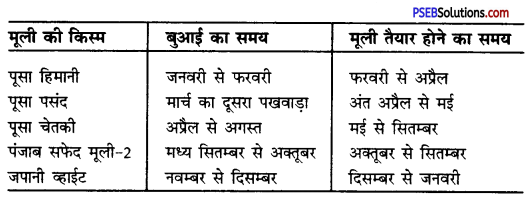
![]()
![]()
![]()
![]()
![]()
![]()
![]()
![]()
![]()
![]()
![]()
![]()
![]()
![]()
![]()
![]()
![]()
![]()
![]()
![]()
![]()
![]()
![]()

